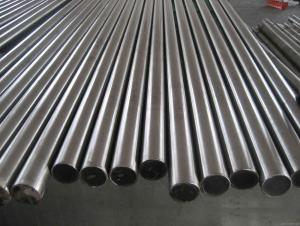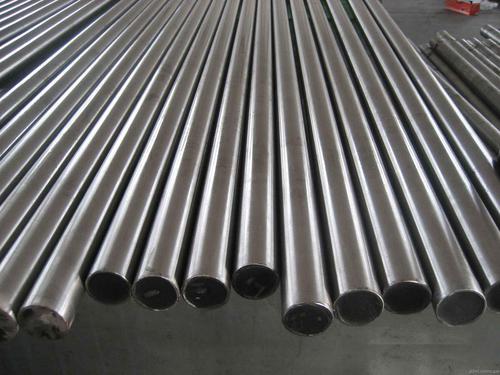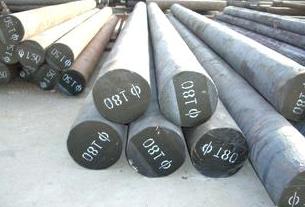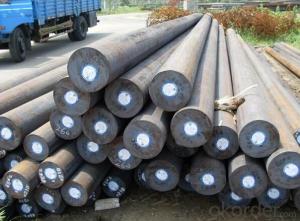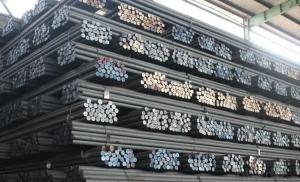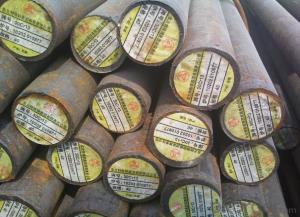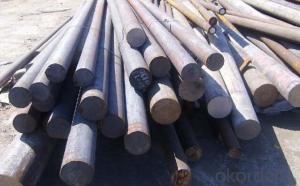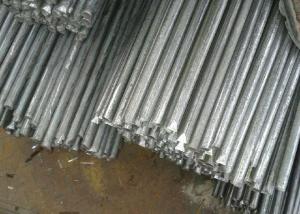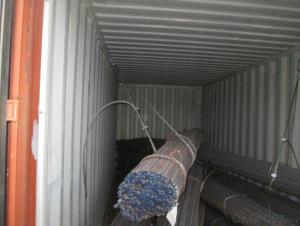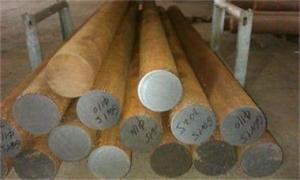Round Bar Bearing Carbon Steel High Quality
- Loading Port:
- China Main Port
- Payment Terms:
- TT or LC
- Min Order Qty:
- -
- Supply Capability:
- -
OKorder Service Pledge
OKorder Financial Service
You Might Also Like
Product Description:
OKorder is offering Bearing steel at great prices with worldwide shipping. Our supplier is a world-class manufacturer of steel, with our products utilized the world over. OKorder annually supplies products to European, North American and Asian markets. We provide quotations within 24 hours of receiving an inquiry and guarantee competitive prices.
Product Applications:
Bearing steel is used for manufacturing ball, roller bearing steel and rings. Bearing in work is under great pressure and friction, so have high demands bearing steel and hardness and resistance, and high elastic limit.
Bearing steels are used for ball and roller bearing applications and are comprised of low carbon steels and high carbon through harden able steel.
For example, bearing ring, steel rolling mill, machinery, 100Cr6 bearing steel ball is widely used in high-speed and low-noise bearing, bicycle, motorcycle, automobile, bags electronically.
Product Advantages:
OKorder's Bearing steel are durable, strong, and resist corrosion.
Main Product Features:
· Premium quality
· Prompt delivery & seaworthy packing (30 days after receiving deposit)
· Corrosion resistance
· Can be recycled and reused
· Mill test certification
· Professional Service
· Competitive pricing
Product Specifications:
Grade | bearing steel EN-31 |
Dimensions | Diameter: 20-280mm Length: 2000-5800mm |
Shape | Round Bar |
Type | High chromium bearing steel |
HBS | <220 |
Standard | AISI |
Technique | Hot Rolled |
Note of Bearing Steel
1. According to national standard (GB) for our products, if not, supply according to national standards (GB) or agreement.
2. We can not only provide electric furnace +LF+VD and electros lag re-melting (ESR) steel forging materials, but also forging products of piece, bar, etc.
3. Our company is equipped with roll equipment and can provide our customers with roll billets or finished.
4. The materials that we purchase are all accord with International General Standard; you could check it out on the Material Quality Sheet.
5. We are the creator of the “seven-step inspect method” in China.
6. The technical workers we employed are the ones with many years’ working experience, who know the technology procedures very well.
7. We will strictly inspect our production that we sold according to the customer’s request.
8. Our steel reaches international quality standards. Besides, our company is equipped with large-sized vertical saw machines, horizontal saw machines, milling machines, grinding machines and other advanced equipment. All our products are carried out hardness tests, such as the ultrasonic flaw detection before shipment. Therefore, there is no quality problem. With more competitive price than other suppliers, our steel has good sales in the markets of North America, South America, East Europe, Southeast Asia, Africa, Oceania, the Middle East, East Asia and West Europe.
FAQ:
Q1: Why buy Materials & Equipment from OKorder.com?
A1: All products offered byOKorder.com are carefully selected from China's most reliable manufacturing enterprises. Through its ISO certifications, OKorder.com adheres to the highest standards and a commitment to supply chain safety and customer satisfaction.
Q2: How do we guarantee the quality of our products?
A2: We have established an advanced quality management system which conducts strict quality tests at every step, from raw materials to the final product. At the same time, we provide extensive follow-up service assurances as required.
Q3: How soon can we receive the product after purchase?
A3: Within three days of placing an order, we will begin production. The specific shipping date is dependent upon international and government factors, but is typically 7 to 10 workdays.
Images:
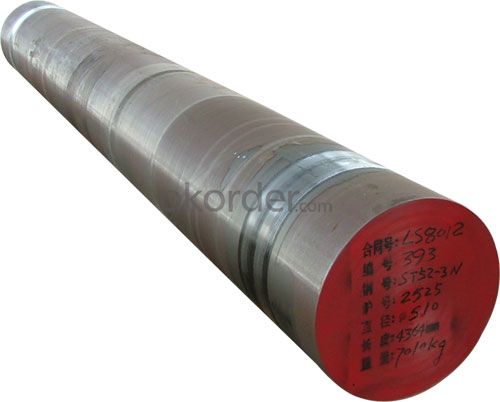
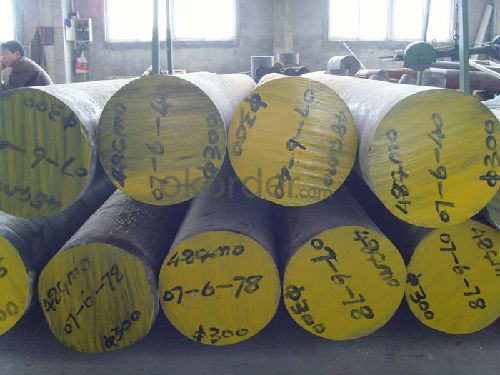
- Q: What are the different coating materials used for special steel?
- There are several different coating materials used for special steel, depending on the specific requirements and applications. Some common coating materials include zinc, nickel, chrome, tin, and ceramic coatings. These coatings provide various benefits such as corrosion resistance, improved wear resistance, enhanced aesthetics, and increased durability. The choice of coating material depends on factors like the intended use of the steel, environmental conditions, and desired performance characteristics.
- Q: How does special steel contribute to the telecommunications aftermarket industry?
- Special steel contributes to the telecommunications aftermarket industry by providing durable and high-quality components for various telecommunications equipment. This steel is used in the manufacturing of antennas, towers, cables, and other crucial parts, ensuring the reliability and longevity of the telecom infrastructure. Additionally, special steel's unique properties, such as corrosion resistance and high electrical conductivity, enhance the performance and efficiency of telecommunications systems, enabling seamless connectivity and better communication services.
- Q: How does special steel perform in high-temperature corrosion resistance?
- Special steel is renowned for its outstanding performance in resisting corrosion at high temperatures. It is specifically crafted to endure harsh circumstances and maintain its integrity even when exposed to elevated temperatures. The composition of special steel incorporates various alloying elements, including chromium, nickel, molybdenum, and others, which enhance its resistance to corrosion in high-temperature settings. When subjected to high temperatures, numerous materials have a tendency to oxidize or react with the surrounding environment, resulting in corrosion and deterioration. However, special steel develops a protective oxide layer on its surface, serving as a barrier against corrosive elements. This oxide layer, primarily composed of chromium, remains stable and possesses self-repairing properties, effectively preventing further corrosion and upholding the structural integrity of the steel. Moreover, the incorporation of alloying elements like molybdenum enhances the steel's ability to resist pitting and crevice corrosion, which are commonly observed in high-temperature environments. Special steel also exhibits exceptional mechanical properties even at elevated temperatures, ensuring structural stability and preventing deformation or failure under stress. Additionally, special steel is frequently subjected to heat treatment to bolster its resistance to corrosion at high temperatures. Heat treatment processes such as annealing, tempering, or quenching and tempering optimize the steel's microstructure and mechanical properties, rendering it more impervious to corrosion in extreme conditions. In conclusion, special steel excels in its ability to resist corrosion at high temperatures due to its distinct composition, protective oxide layer, and heat treatment procedures. It is a dependable and long-lasting material choice for applications that involve exposure to elevated temperatures and corrosive environments, such as in chemical processing plants, power generation facilities, or oil and gas refineries.
- Q: How is special steel used in the production of pressure vessels?
- Special steel is used in the production of pressure vessels due to its high strength, durability, and resistance to corrosion. It ensures the vessel can withstand high internal pressure and harsh operating conditions, ensuring safety and reliability.
- Q: What are the requirements for special steel used in aircraft manufacturing?
- The requirements for special steel used in aircraft manufacturing are quite stringent due to the critical nature of the components and the demanding operating conditions in which they are subjected. Here are some key requirements: 1. High strength: Special steel used in aircraft manufacturing must possess exceptional strength to withstand the extreme forces and loads experienced during flight. This ensures the structural integrity and safety of the aircraft. 2. Lightweight: While strength is crucial, special steel for aircraft must also be lightweight to minimize the overall weight of the aircraft. This helps enhance fuel efficiency and allows for increased payload capacity. 3. Corrosion resistance: The steel must exhibit excellent resistance to corrosion, as aircraft are often exposed to harsh environments, including high humidity, saltwater, and various chemicals. Corrosion resistance helps maintain the structural integrity and prolong the lifespan of the aircraft. 4. Fatigue resistance: Special steel must have high fatigue resistance to withstand repetitive loading and unloading cycles that occur during flight. This ensures that the components do not fail prematurely due to cyclic stress. 5. Heat resistance: The steel should be able to withstand high temperatures generated by the engines, as well as the heat generated during high-speed flight. Heat resistance prevents deformation, melting, or loss of strength under extreme thermal conditions. 6. Weldability: Special steel used in aircraft manufacturing should possess good weldability, allowing for efficient and reliable joining of components during the manufacturing process. This ensures strong and secure connections between various parts of the aircraft. 7. Non-magnetic properties: In certain applications, such as electronic systems, it is essential for the steel to be non-magnetic to prevent interference with sensitive equipment. 8. Traceability and certification: The steel must have proper traceability and certification to meet industry standards and regulatory requirements. This includes documentation of the steel's composition, manufacturing process, and testing procedures to ensure consistent quality and performance. Meeting these requirements is essential to ensure the safety, reliability, and efficiency of aircraft. Special steel used in aircraft manufacturing undergoes rigorous testing, quality control, and certification processes to ensure it meets these stringent requirements before being used in the construction of aircraft components.
- Q: How is magnetic alloy steel used in the production of magnetic components?
- Magnetic alloy steel is used in the production of magnetic components due to its unique magnetic properties. It is commonly used to make permanent magnets, such as those found in electric motors, generators, and transformers. The alloy's high magnetic permeability and saturation induction make it ideal for creating strong magnetic fields. Additionally, its resistance to demagnetization and ability to retain magnetism at high temperatures make it suitable for various applications in industries like automotive, aerospace, and electronics.
- Q: What is the role of research and development in advancing special steel technology?
- The role of research and development in advancing special steel technology is crucial. Through continuous research and development efforts, new and improved manufacturing processes, alloys, and applications for special steel can be discovered and developed. This leads to advancements in the properties and performance of special steel, making it more durable, resistant to wear and corrosion, and capable of meeting the evolving needs of industries such as automotive, aerospace, and energy. Additionally, research and development help in optimizing production techniques, reducing costs, and promoting sustainability in the special steel industry. Overall, research and development play a vital role in pushing the boundaries of special steel technology, enabling innovation and driving progress in various sectors.
- Q: How does mold steel resist wear and erosion?
- Mold steel resists wear and erosion due to its high hardness, toughness, and resistance to deformation. It has a fine microstructure that allows it to withstand the repetitive stresses and strains associated with molding processes. Additionally, certain alloying elements like chromium and molybdenum enhance its corrosion resistance, making it more durable against wear and erosion caused by environmental factors.
- Q: What are the main properties of special steel?
- The main properties of special steel include high strength, excellent corrosion resistance, superior heat resistance, good toughness, and exceptional wear resistance. Additionally, special steel often exhibits high ductility, machinability, and weldability, making it suitable for various applications in industries such as automotive, aerospace, and construction.
- Q: What are the different methods of improving the toughness of special steel?
- There are several methods of improving the toughness of special steel. One common method is through heat treatment, such as quenching and tempering, which involves rapidly cooling the steel to increase its hardness and then reheating it to improve its toughness. Another method is alloying, where elements like nickel, chromium, and molybdenum are added to the steel to enhance its toughness. Additionally, refining the steel's microstructure through processes like grain-size control and precipitation hardening can also improve its toughness.
Send your message to us
Round Bar Bearing Carbon Steel High Quality
- Loading Port:
- China Main Port
- Payment Terms:
- TT or LC
- Min Order Qty:
- -
- Supply Capability:
- -
OKorder Service Pledge
OKorder Financial Service
Similar products
Hot products
Hot Searches
Related keywords
